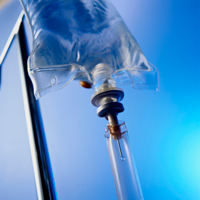Goal of Chemotherapy for Breast Cancer

Chemotherapy uses drugs to kill cancer cells. It’s a systemic treatment. That means it affects your whole body. The drugs travel all through your body in your bloodstream, killing rapidly dividing cancer cells. Here are some ways chemotherapy works:
-
It may disrupt cell growth.
-
It may prevent cells from reproducing.
-
It may help your immune system identify and destroy the “invader” cancer cells.
Chemotherapy may be able to cure cancer -- meaning the tumor disappears and doesn’t return. If a cure isn’t possible, chemotherapy may help keep the cancer from growing or spreading. Or, if the cancer is advanced and can’t be controlled, chemotherapy may help ease symptoms caused by cancer and improve your quality of life.
Making the decision to have chemotherapy
Your doctor may suggest chemotherapy to treat breast cancer in any of the following situations:
-
Before your surgery or radiation (called neoadjuvant chemotherapy). You usually undergo this form of chemotherapy for several months. It's most often used to shrink the tumor so that it's smaller and may allow you to have breast-conserving surgery.
-
After surgery (called adjuvant chemotherapy). You usually undergo it for 4 to 6 months. Adjuvant chemotherapy helps prevent the cancer from spreading and coming back. Whether your doctor recommends it depends on the tumor's size, whether it has spread to lymph nodes, and other features.
- When the breast cancer has spread to other parts of your body. Because chemotherapy is a systemic therapy (it travels throughout the body to kill cancer cells), it can be used to kill cancer cells that have spread. How long this treatment lasts depends on how much the tumors shrink.
Schedule a Mammogram at Richmond University Medical Center
Early detection and treatment is the best strategy for a better cancer outcome. Schedule your mammogram at RUMC: Call 718-818-3280.
Kathy Giovinazzo is Director of Radiology at Richmond University Medical Center.
For More Information
For more information or to schedule an appointment, contact Dr. Thomas Forlenza at 718-816-4949. His office is located at 1366 Victory Blvd on Staten Island.
Dr. Forlenza is the Director of Oncology at Richmond University Medical Center.
© 2026 The StayWell Company, LLC. All rights reserved. This information is not intended as a substitute for professional medical care. Always follow your healthcare provider's instructions.